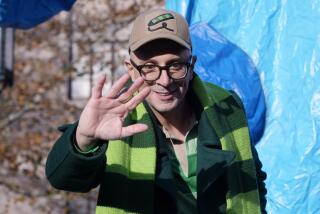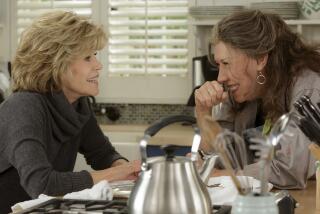He’ll Be 100, by George! : The Greatness of Burns, Who Hits That Milestone Saturday, Takes Many Forms--Straight Man and Innovator--but Always Delights
- Share via
George Burns will be a century old on Saturday. But when I encountered him, he was a callow adolescent of 89.
Our meeting came in his manager’s office, where I was to interview him for a magazine story I was writing. Someone had driven him over. He was alert, loquacious and funny, as if on automatic pilot while keeping up a running patter of anecdotes and vaudevillesque jokes in his familiar raspy monotone.
For someone his age, he was awesome. He even sang for me, also in a monotone. It mattered not that his audience was just a reporter and tape recorder. After more than seven decades in the business, an audience was an audience, and he was on a roll, a fissure of a smile hinting that he was enjoying himself.
The appeal and fame of George Burns are generational. Different age groups, different prisms. Most Americans know him only as the creaky apparition who continued smoking cigars and cracking jokes about his ageless virility after bursting from the relative obscurity of old genthood with such ease and aplomb, to make a movie in 1975, that you pictured him standing in the wings all those years with a tall blond on each arm, waiting patiently for another shot at center stage.
Burns and his late wife, Gracie Allen, had appeared in a bunch of movies in the 1930s. So it was in character, at least, that he should make his contemporary comeback on the big screen. It began with him as a cranky ex-vaudevillian opposite Walter Matthau in “The Sunshine Boys,” a role that had been ticketed for his friend, Jack Benny, before his death. Later he hit it even bigger as The Almighty in Carl Reiner’s “Oh, God!,” then reprised that role a couple of times and appeared in various other trifles before bowing out (apparently) in 1988 with a cameo in “18 Again!”
Because he was then 92 and a widely beloved curiosity, what he did mattered less to his public than that he was still alive to do it, and then to schmooze about it so amusingly on talk shows.
The guy should have been a potted plant. Yet after all these years, he still made you laugh.
*
Older Americans, however, will recall that Burns’ brawniest contributions came millennia earlier in partnership on radio and TV with the matchless Gracie, whom he married in 1926 after they had been a vaudeville team for four years.
Born Nathan Birnbaum in New York, George had entered vaudeville as a single, continually changing his name to get work. When a performer named Eddie Delight quit the business shortly after printing up 2,000 business cards, George inherited the cards and changed his name to Eddie Delight. After the cards ran out, as George has spun the tale many times, he was Billy Pierce, Captain Betts, Jed Jackson, Jimmy Malone, Williams of Brown and Williams (they tap-danced on roller skates), Burns of Burns and Jose, Glide of Goldie, Fields and Glide and half of Burns and Links. George was Links.
How much of this is actually true and how much pure fancy or embellishment? Well, as Oliver Stone might say, all of it could have happened.
In any case, only as half of Burns and Allen did George become a star in vaudeville (after reversing their roles and making himself the straight man when she got all the laughs). Later they were headliners on radio before striking it big on television.
“The George Burns and Gracie Allen Show” grew and flourished along with TV, running on CBS from 1950 to 1958. Some of the episodes, including the pilot, are available on video, and watching a few the other day reminded me not only how funny these two were at their best, but also that George was much greater as Gracie’s TV husband than as God.
Drawing from their vaudeville and radio acts, Burns and Allen pretended to play themselves on their TV series, simulating home life with George cast as bemused but ever-tolerant straight man to a scrambled Gracie, so secure in her impenetrable daftness that those around her at times begin to question their own rationality.
George: “Do you like to love?”
Gracie: “No.”
George: “Do you like to kiss?”
Gracie: “No.”
George: “What do you like?”
Gracie: “Lamb chops.”
George: “A little girl like you? Could you eat two lamb chops alone?”
Gracie: “No. But with potatoes I could.”
On another episode, Gracie and the show’s announcer, Harry Von Zell, mistakenly believed that George was despondent and about to commit suicide.
Harry: “You better get his razor.”
Gracie (reproachfully): “Oh, Harry. If he was going to kill himself, would he bother shaving?”
Delivered with almost childlike sincerity, Gracie’s chirped dizziness evoked stony befuddlement, stunned disbelief or a silence to let her words sink in, but never ridicule. Great pains were taken by George not to cross a line with Gracie’s character. She was plenty mixed up, yet not quite nutty.
The series, as producer-director Ralph Levy would later note, was a cross between a sitcom and vaudeville. It was also a complexly layered show about a show whose format was cloned in the 1980s (superbly) by the Showtime/Fox series “It’s Garry Shandling’s Show” (now rerunning on Comedy Central), but one whose intricate, overlapping structure is unmatched by TV comedies of the ‘90s.
There was something of Thornton Wilder’s “Our Town” in the narrator- addressing- the- audience style of “The George Burns and Gracie Allen Show.” Burns would usually open with a brief monologue to the camera, then while taking part in the show would periodically step outside the set, lean against a column, puff on his cigar and comment wryly about Gracie and what was or wasn’t happening.
“Now I think it’s time to put a little plot in the show,” he remarked at one point in the pilot. At other times he would retire upstairs to watch the show inside the show on a TV set in his office, comment on it, then return downstairs and reenter the story.
Nothing topped the out-of-body fun written into Fred Clark’s final episode as next-door neighbor Harry Morton. Harry’s wife, Blanche (Bea Benaderet), was so angry at him that she was about to clobber him with a vase as he prepared to enter the house. “Hold it!” interrupted George, who explained to viewers about Clark leaving the show and then introduced the new Harry (Larry Keating) to the audience and Blanche, after which Keating exited and then reentered so that Blanche could hit him with the vase.
Each episode would ultimately come full circle, with George and Gracie reappearing in front of the curtain, where she would earn the last laugh with a crowning absurdity and then obey her husband’s command to “Say good night, Gracie.”
His many dimensions as a comic, to say nothing of his mastery of the classic reactive pause after Gracie’s punch lines, made Burns flat-out the best and funniest straight man I’ve ever seen. Funnier than Bud Abbott. Funnier than Dean Martin. Funnier than Dan Rowan.
*
With much credit due his writers, he was also the funniest at talking about it. During one episode of the “Burns and Allen” show, he exited the set to deliver a monologue on the duties of straight men, such as repeating what the comedian said as a setup for the punch line.
“I’ve been a straight man for so many years that, from force of habit, I repeat everything,” he explained. “I went out fishing with a fellow the other day and he fell overboard. He yelled, ‘Help! Help! Help!’ So I said, “Help? Help? Help?’ And while I was waiting for him to get his laugh, he drowned.”
Gracie retired in 1958, after which George and most of the regulars continued in a somewhat altered series that lasted only one season. Although he clearly needed her and always gave her the credit, it’s equally improbable--lamb chops needing potatoes--that she could have done the show successfully without him. Gracie died in 1964, and only 11 years later did her husband’s career regain some of the luster they once shared.
Part of his greatness is that his voice and unique delivery still resonate in your mind, bringing smiles, as you anticipate saying good night to George Burns, too. But not quite yet.
More to Read
Only good movies
Get the Indie Focus newsletter, Mark Olsen's weekly guide to the world of cinema.
You may occasionally receive promotional content from the Los Angeles Times.










